#the capitalist and economic environment
Text
Man I really should’ve gotten a job and a house in 1990
#I was born in 2002#the capitalist and economic environment#we live in#makes me want to not live anymore#vent#it’s actually so fucking awful#and scary#I didn’t know I had it good when I was like 2 fucking years old
30 notes
·
View notes
Text
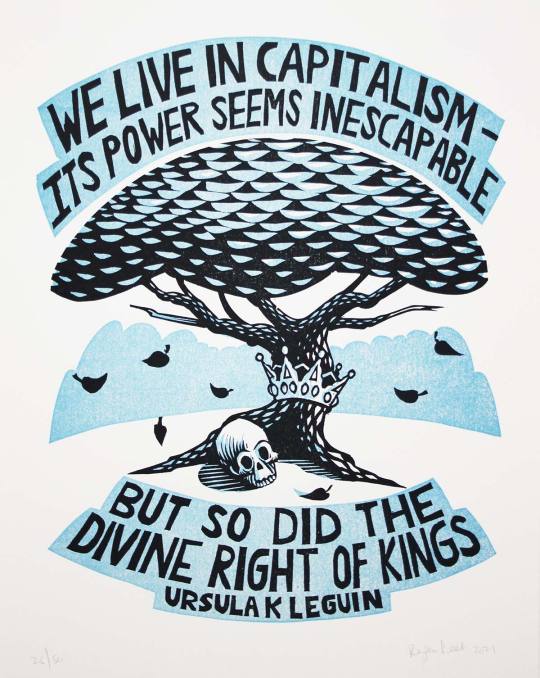
Artist credit:
#ursula k. le guin#hopepunk#hope punk#solar punk#solarpunk#futurism#climate and environment#climate action#climate hope#climate chaos#clean energy#capitalist society#capitalism#capitalist dystopia#resistance#faith in the future#economic justice#workers rights#imagine better
2K notes
·
View notes
Text

A.2.4 Are anarchists in favour of “absolute” liberty?
No. Anarchists do not believe that everyone should be able to “do whatever they like,” because some actions invariably involve the denial of the liberty of others.
For example, anarchists do not support the “freedom” to rape, to exploit, or to coerce others. Neither do we tolerate authority. On the contrary, since authority is a threat to liberty, equality, and solidarity (not to mention human dignity), anarchists recognise the need to resist and overthrow it.
The exercise of authority is not freedom. No one has a “right” to rule others. As Malatesta points out, anarchism supports “freedom for everybody … with the only limit of the equal freedom for others; which does not mean … that we recognise, and wish to respect, the ‘freedom’ to exploit, to oppress, to command, which is oppression and certainly not freedom.” [Errico Malatesta: His Life and Ideas, p. 53]
In a capitalist society, resistance to all forms of hierarchical authority is the mark of a free person — be it private (the boss) or public (the state). As Henry David Thoreau pointed out in his essay on “Civil Disobedience” (1847)
“Disobedience is the true foundation of liberty. The obedient must be slaves.”
#faq#anarchy faq#revolution#anarchism#daily posts#communism#anti capitalist#anti capitalism#late stage capitalism#organization#grassroots#grass roots#anarchists#libraries#leftism#social issues#economy#economics#climate change#climate crisis#climate#ecology#anarchy works#environmentalism#environment#solarpunk#anti colonialism#mutual aid#cops#police
131 notes
·
View notes
Text
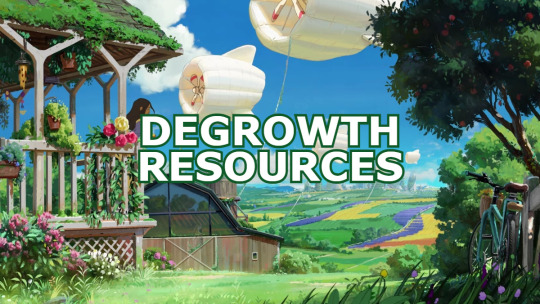
Degrowth basics
"The word degrowth stands for a family of political-economic approaches that, in the face of today’s accelerating planetary ecological crisis, reject unlimited, exponential economic growth as the definition of human progress."
What is Degrowth? | Caracol DSA
Why degrowth is the only responsible way forward | OpenDemocracy
Degrowth and MMT: A thought experiment
We Need A Fair Way To End Infinite Growth | Current Affairs
Degrowth: A Call for Radical Abundance | Common Dreams
Can degrowth save us and the planet? | Nottingham Trent
Defending limits is not Malthusian | Undisciplined Environments
Can We Have Prosperity Without Growth? | New Yorker
The Urgent Case for Shrinking the Economy | The New Republic
Giving Up on Economic Growth Could Make Us Cooler and Happier | The New Republic
A guide to degrowth: The movement prioritizing wellbeing in a bid to avoid climate cataclysm | CNBC
What is ‘degrowth’ and how can it fight climate change? | Popular Science
Enough for Everyone | Yes! Magazine
Toward a Post-Capitalist Future: On the Growth of “Degrowth” | Lit Hub
All we are saying is give degrowth a chance | The RSA
A pathway out of environmental collapse | newsroom
On Technology and Degrowth | Monthly Review
What is degrowth (and more importantly, what is it not)? | META
Green growth
"There is no empirical evidence that absolute decoupling from resource use can be achieved on a global scale against a background of continued economic growth."
Is Green Growth Possible? | Jason Hickel & Giorgos Kallis
The Myth of America’s Green Growth | Foreign Policy
The decoupling delusion: rethinking growth and sustainability | The Conversation
Is green growth happening? | Uneven Earth
Green Growth | Uneven Earth
The Delusion of Infinite Economic Growth | Scientific American
Degrowth is not austerity – it is actually just the opposite | Al Jazeera
A response to Paul Krugman: Growth is not as green as you might think | Timothée Parrique
Deceitful Decoupling: Misconceptions of a Persistent Myth | Alevgul H. Sorman
Degrowth isn’t the same as a recession – it’s an alternative to growing the economy forever | The Conversation
Degrowth and the left
"In the middle of an ecological emergency, should we be producing sport utility vehicles and mansions? Should we be diverting energy to support the obscene consumption and accumulation of the ruling class?"
The Left should embrace degrowth | New Internationalist
Ecosocialism is the Horizon, Degrowth is the Way | The Trouble
Degrowth: Socialism without Growth | Brave New Europe
Toward an Ecosocialist Degrowth: From the Materially Inevitable to the Socially Desirable | Monthly Review
For an Ecosocialist Degrowth | Monthly Review
Degrowth and Revolutionary Organizing | Rosa Luxemburg NYC
The necessity of ecosocialist degrowth | Rupture
Degrowth is Anti-Capitalist | Protean Mag
Degrowth Communism | PPPR (Part one | Part two | Part three)
Economic Planning and Degrowth: How Socialism Survives the 21st Century | New Socialist
Degrowth and the South
"Southern countries should be free to organize their resources and labor around meeting human needs rather than around servicing Northern growth."
Who is afraid of degrowth? A Global South economic perspective | IBON Foundation
The anti-colonial politics of degrowth | Jason Hickel
Unlearning: From Degrowth to Decolonization | Rosa Luxemburg NYC
Degrowth requires the Global South to default on its foreign debts | Resilience
Journals/Reports
Degrowth: a theory of radical abundance | Jason Hickel
A systematic review of the evidence on decoupling of GDP, resource use and GHG emissions, part II: synthesizing the insights
What does degrowth mean? A few points of clarification | Jason Hickel
Providing decent living with minimum energy: A global scenario | Global Environmental Change
Urgent need for post-growth climate mitigation scenarios | Nature Energy
Degrowth and critical agrarian studies | Julien-François Gerber
Decoupling debunked – Evidence and arguments against green growth as a sole strategy for sustainability | European Environmental Bureau
Incrementum ad Absurdum: Global Growth, Inequality and Poverty Eradication in a Carbon-Constrained World | David Woodward
Degrowth can work — here’s how science can help | Nature
A New Political Economy for a Healthy Planet | Jason Hickel
Planning beyond growth. The case for economic democracy within limits
Millionaire spending incompatible with 1.5 °C ambitions | Cleaner Production Letters
Is green growth happening? An empirical analysis of achieved versus Paris-compliant CO2–GDP decoupling in high-income countries | The Lancet
Books
Exploring Degrowth: A Critical Guide | Pluto Press
A People's Green New Deal | Max Ajl
Less is More: How Degrowth Will Save the World | Jason Hickel
Breaking Things at Work: The Luddites Are Right About Why You Hate Your Job | Verso Books
The Future is Degrowth: A Guide to a World Beyond Capitalism | Verso Books
The Imperial Mode of Living: Everyday Life and the Ecological Crisis of Capitalism | Verso Books
Marx in the Anthropocene: Towards the Idea of Degrowth Communism | Kohei Saito
Degrowth & Strategy: how to bring about social-ecological transformation
27 Essays and Thoughts on Degrowth | Giorgos Kallis
Videos
Yes To Limits To Growth! | The Other School
How Degrowth Can Save the World | Andrewism
How We End Consumerism | Our Changing Climate
Demystifying Degrowth | Rosa Luxemburg NYC
Degrowth is not Austerity | John the Duncan
Degrowth and Ecosocialism | Planet: Critical
Degrowth in 7 minutes: Fighting for climate by living better | Think That Through
The Future is Degrowth (w/ Aaron Vansintjan) || SRSLY WRONG
"Degrowth means power to the working class!"with Jason Hickel | GND Media
Others
degrowth.info
Degrowth Journal
Doughnut Economics
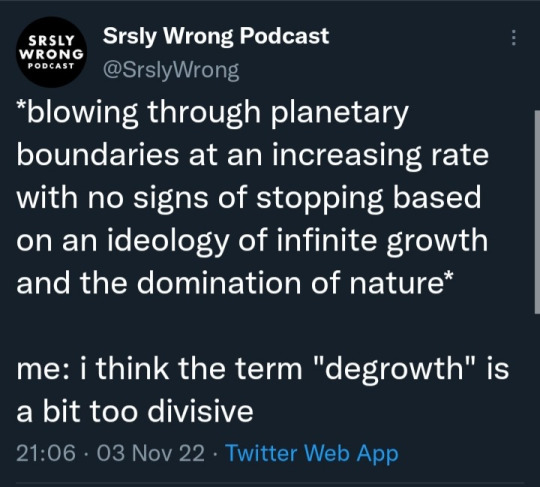
2K notes
·
View notes
Text
As a revolutionary transmasc feminist, what do I need?
Just like every other person who was assigned female at birth, I need the patriarchy eradicated.
Just like every other trans person, I need the patriarchy eradicated.
Just like every other neurodivergent and mentally ill person, I need the patriarchy eradicated.
Just like every other person living on this planet, I need the patriarchy eradicated.
The patriarchy as it is manifesting right now is inextricably entwined with capitalism, and capitalism reinforces the patriarchy. This creates and maintains the immense economic inequality people face across the planet. To be a feminist is to be an anti-capitalist.
This also drives the our destruction of our planet, our natural resources and our environment in the pursuit of more profit. I can't be an environmentalist without being a feminist.
And I can't speak as a person of color because I'm not one, but there is plenty of feminist literature by people of color discussing how anti racism is an absolutely necessary part of feminism. As always, bell hooks and Kimberlé Crenshaw are great places to start.
There is so much more I could say, but this is just a starting point.
364 notes
·
View notes
Note
ngl as an abuse survivor the whole “micro trauma” thing makes me roll my eyes back into my head like that’s life babe sometimes we have a negative experience it’s not trauma 💀💀💀 i really feel like so many folks live soft lives that any negative feeling becomes “traumatic” and something to avoid. i don’t think it’s good to conflate times your ego was tested or times that didn’t go exactly your way with genuine trauma. you’re more resilient than that. (obviously this isn’t about day to day trauma living as a bipoc in a racist white society etc but i don’t think you were talking about that either)
Welp, there's a lot to unpack here.
First of all, I'm an abuse survivor with my own share of trauma. I was raised in a form of conservative apocalyptic Christianity where beatings were considered an acceptable form of punishment. Because my parents believed that parental authority was never wrong, and anything a child did or even felt that seemed to challenge that authority (whether intentional or not), I was constantly told that I was wrong for having my own feelings, punished for having my own feelings if I dared to to express them. In addition to this, my family thought I needed to be very aware that the Mark of the Beast was coming and I needed to emotionally prepare myself for beheading once the Antichrist took over and started killing anyone who refused the Mark of the Beast.
In addition to this, I was subject to all of the day-to-day trauma that comes from growing up with ADHD and autism in an ableist society, as well as the trauma that comes from growing up with ADHD and autism in an environment where people think children must be obedient at all times. (My parents believed spanking and slapping was fine, by the way. So, that happened often enough. And when it wasn't spanking or slapping, it was my mother screaming and yelling.)
Now with all of this context established, I'm going to tell you: You don't get to decide who does and doesn't get to have trauma. Trauma doesn't work according to some abstract notion of what should and shouldn't constitute "trauma." People can, in fact, be genuinely traumatized over things that seem totally ridiculous to you.
Also? You don't know what other people are living through. You don't know what goes on behind closed doors. You don't know how people are being traumatized by economic circumstances, by bullshit at the workplace, by knowing that Christofascists want to subjugate them or kill them. You don't know how many people are being slowly traumatized by partners who invalidate and mock them in countless tiny ways every day. You don't know how many people are being traumatized by thinking they should be able to meet certain expectations that they don't realize are based in ableist standards or impossible capitalist ideals.
You've also evidently never had a conversation with someone who can't figure out how they're such a mess because they "don't have a reason to be traumatized," but the more you talk to them the more it comes out that they lived a profoundly messed up life, and were profoundly mistreated in a thousand ways that they didn't even recognize as mistreatment at the time. (No, it's not normal for your mother to call you ableist slurs if you can't tend to her every whim in five seconds.)
You also say "obviously this isn’t about day to day trauma living as a bipoc in a racist white society etc but i don’t think you were talking about that either." And you know what? You wanna know what? I absolutely was, because my post was meant to be inclusive of all forms of microtrauma.
Anyway, I hope you can recognize that suffering and trauma aren't a contest, and trying to decide who does and doesn't "deserve" to have trauma based on your own personal abstract ideals and limited comprehension of their lives doesn't help anyone.
337 notes
·
View notes
Note
wanted to ask what your thoughts are about the show’s subtextual implications of csa? its never mentioned really but it kind of just hangs in the air with the other abuse and the cultural of sexual violence and abuse of everyone and everything else. i personally don’t believe logan even abused any of them that way, but obviously with people like mo and that whole group of men at the funeral, it was still something the kid’s grew up around and were vulnerable to, and i think because of that logan Did perpetuate csa against them, in a way. like even if He never touched them, by putting them in such close proximity to predators and he himself being complicit in a culture of sexual violence both in his personal life and his company, he still betrayed their trust that he would protect them from that.
but idk, do you think there’s a possibility any of them were actually victims of an assault or harassment?
this is kind of a huge topic, but: i think what the show is getting at wrt sexual violence and childhood trauma is the idea that growing up in a context that enables and even encourages rape is itself sexually traumatic, and that type of immersion in systemic violence has a profound impact on the psyche with or without specific or discrete instances of direct interpersonal violence. which is to say, yes, i agree that there is a very real way in which all of logan's children have experienced sexual violence simply by virtue of being part of his company and his family (part of the capitalist structure).
i do agree that the presence of the 'wolf pack' is significant (the kids weren't allowed to get in the pool around them, etc), but even beyond that, i think the show is suggesting that it would be impossible to grow up in an environment where 1) sex is equivalent to violence, and 2) business is expressed through this language, and 3) familial love is secondary to the business concerns and so also expressed through this violent language—and not be traumatised by that. capitalism is itself already traumatic, homophobia and transmisogyny / transphobia are traumatic, and logan's rigid hierarchical ideas of masculinity and strength are elevated expressions of these systems.
anybody in waystar's orbit will have a relationship to sexual violence and trauma—and a child, who lacks legal personhood and bodily autonomy, is quite clearly going to experience this entire upbringing as violent and traumatic. like, even if logan's childrearing was 'successful' on his terms, ie produced an heir capable of the kind of emotional repression and capacity to inflict violence that logan valorises, that would still itself be a traumatic outcome for that person. the ideology governing waystar is alienating and intrinsically violent. how could you grow up in a world where the powerless are denied personhood and subject to rape and murder and not have that shape how you—again, a child denied autonomy and power—relate to your body, your sexuality, and your concept of self?
so, as to whether the kids did experience specific and direct events of child sexual assault, rape, etc—i honestly just find this line of questioning uninteresting because it's speculation. i've already said i don't find the 'explicit' csa reading necessary in understanding roman's character, and that the incestuous sub/text with him is there on purpose not to indicate that the roys are uniquely incestuous but to suggest that capitalist family structures inherently create this type of desire and propensity for abuse. i would extend basically analogous arguments to the other roy kids, and indeed, to any character on the show. all of the roy kids are sexually traumatised and this is explicitly because they grew up in a company (which is to say also a family and an economic system) that is violent, specifically sexually and specifically to those designated weaker and lesser-than.
419 notes
·
View notes
Text
"When I first went to Jamaica in 2012 as a graduate student studying the environmental politics of the Maroons, an Afro-Indigenous community who freed themselves from enslavement in the 18th century and established an autonomous society in the mountainous interior of the island, Chinese overseas development policy seemed irrelevant to my work. Yet as my field research progressed over the following eight years, first as a doctoral student in African diaspora studies and then as a post-doctoral researcher, the impact of Chinese infrastructural development and extractive industry on the Jamaican people and environment became increasingly apparent.
The timing of my field work overlapped with an unprecedented surge in Chinese economic and diplomatic engagement with Jamaica and the Caribbean as a whole.
(...)
It is beyond the scope of this article to detail the political economic dynamics and immense social impact of debt in Jamaica over the last 40 years.4 Suffice it to say that the island became a byword for structural adjustment during this period, with every new loan from the World Bank, or default on payments thereof, coming with International Monetary Fund-mandated austerity.
Health and education were notable casualties of this socio-economic assault. By the start of my field research, Jamaican child mortality had almost doubled over the span of a single decade while completion of primary school dropped from 97% to 73% in the same period. This despite the fact that Jamaica had already repaid more money than it had been lent, with continuing debt servicing accounting for a 106% debt-to-GDP ratio according to the latest World Bank figures.
All this is only a small snapshot of the catastrophic outcomes of debt wielded as a tool of neocolonialism.
With the island’s status as one of the most indebted countries on the planet, Chinese infrastructural development was received with fanfare from Jamaican elites, a possible economic lifeline out of the debt trap.
(...)
Jamaican elites may appreciate that they can pay back debts with land, and that China does not directly require broad policy changes like the structural adjustment conditions of IMF and World Bank loans.
However, even with the above and the fact that the Jamaican debt to China is small compared to that claimed by Western IFIs and private firms, Jamaican politicians are growing increasingly wary of the costs of doing business with China. In November 2019, Prime Minister Andrew Holness announced that Jamaica would no longer borrow from China, a scant seven months after formally joining the BRI.
As usual, most Jamaicans are not privy to the inter-governmental discussions and deals driving these decisions, but their government’s newfound reticence in engaging with China reflects deeper concerns among BRI partners that the initiative is a debt trap.
(...)
Almost two decades of Chinese loans and infrastructure-led development have left Jamaican workers and farmers as precarious and dispossessed as ever. The hard-fought and generational struggle for Jamaican workers’ power (trade unions were instrumental to Jamaica’s independence struggle) has been curtailed and rolled back by China’s transposed sovereignty.
Furthermore, Chinese mining interests appear poised to pick up where their Western counterparts left off in terms of irreversible ecological destruction and threats to indigenous survival. Certainly, Jamaica cannot bear another 50 years of capitalist exploitation and extractive industry.
If there is any hope in turning this dire situation into revolutionary momentum, it will be in Jamaicans making common cause with the Chinese laborers imported to the country. According to China Labor Watch, Chinese workers on overseas BRI projects are often subject to “deceptive job ads, passport retention, wage withholding, physical violence and lack of contracts” to the extent of constituting forced labor and human trafficking.
In fact, at least one Chinese worker in Jamaica has already blown the whistle on such conditions. Unfortunately, as of the time of writing this article, there appears to be no organized effort to make solidaristic alliances among Jamaican workers, Chinese workers, and Maroons. The Maroons are organized as an indigenous community seeking land and sovereign rights, rather than workers seeking class emancipation, and remain locked in a fractious political battle with the Jamaican state toward those ends.
Furthermore, the cultural and language barriers between Jamaicans and imported Chinese workers are significant. Yet both countries have rich revolutionary traditions. If Jamaican labor militancy and Maroon struggle were able to reconcile and align their interests, while cultivating strategic allies among the heavily exploited Chinese workers, a powerful relationship of international solidarity from below could be forged."
...
39 notes
·
View notes
Text
There are a lot of companies and people to boycott because of their support for Israel. That list gets even longer when you factor in the companies that are exploiting and oppressing the Congolese people. When I first started boycotting for Palestine, I felt it because I very rarely buy myself extras and I couldn't have a rare treat anymore.
But here's the thing.
Buy local.
You don't need to go to Starbucks or Tim Hortons or McDonald's for a coffee - there is generally always a locally owned cafe for that. If you're hungry, go to the local restaurant or food truck. If you're struggling because you can't go to McDonald's in the morning for your breakfast before work, leave a bit earlier and hit a cafe or do meal prep to make your life easier. Fuck, buying a second hand coffee maker from a local thrift store can save you time and money and most of them have a timer you can set so it'll be ready for when you wake up.
There are businesses that are really hard to avoid (like Walmart, especially for us rural folks), but there are a lot of small lifestyle changes you can make to boycott shitty corps without constantly denying yourself the things that make life worth living in this post-capitalist hellscape. Buying local is better than buying from large companies anyways and with the COVID and current economic crisis combo, most small businesses are still hurting for revenue.
Buying second hand is also a great way to avoid supporting Israel or giving a market to the exploitation in Congo. Using things until their actually fucked beyond repair is a good way too. Learn how to sew, make things from scratch, basic repairs and maintenance on important items... Finding or building a community of like-minded people is so important too because maybe you don't have the expertise or equipment to fix your fridge, but you know a guy who'll trade you fridge repairs for repairs and reinforcements on his kids' winter gear. With that trade, you no longer need a new fridge and they no longer need new winter coats or snowpants.
Especially in North America, we are very consumerist, which I think relates back to when the colonizers and immigrants first came over to find a land of such abundance when they were used to living in relative scarcity. We need to shake our consumerism for the sake of not just the exploited and occupied, but also for the environment. Corps should have never gotten so big as they have, and we can take away their ability to make massive decisions (such as lobbying govts for changes in businesses' favour and helping fund genocide) by not giving them so much power in our individual lives and funding them. By weaponizing ourselves with knowledge, community, and the desire to reject extreme consumerism, corps will need to change their business models and product catalogs to reflect our spending habits and they'll have less money to fuck us over with in the end.
#free palestine#palestine#boycott israel#boycott congo#buy local#from the river to the sea#homesteading
48 notes
·
View notes
Text

A.2.6 Why is solidarity important to anarchists?
Solidarity, or mutual aid, is a key idea of anarchism. It is the link between the individual and society, the means by which individuals can work together to meet their common interests in an environment that supports and nurtures both liberty and equality. For anarchists, mutual aid is a fundamental feature of human life, a source of both strength and happiness and a fundamental requirement for a fully human existence.
Erich Fromm, noted psychologist and socialist humanist, points out that the “human desire to experience union with others is rooted in the specific conditions of existence that characterise the human species and is one of the strongest motivations of human behaviour.” [To Be or To Have, p.107]
Therefore anarchists consider the desire to form “unions” (to use Max Stirner’s term) with other people to be a natural need. These unions, or associations, must be based on equality and individuality in order to be fully satisfying to those who join them — i.e. they must be organised in an anarchist manner, i.e. voluntary, decentralised, and non-hierarchical.
Solidarity — co-operation between individuals — is necessary for life and is far from a denial of liberty. Solidarity, observed Errico Malatesta, “is the only environment in which Man can express his personality and achieve his optimum development and enjoy the greatest possible wellbeing.” This “coming together of individuals for the wellbeing of all, and of all for the wellbeing of each,” results in “the freedom of each not being limited by, but complemented — indeed finding the necessary raison d’etre in — the freedom of others.” [Anarchy, p. 29] In other words, solidarity and co-operation means treating each other as equals, refusing to treat others as means to an end and creating relationships which support freedom for all rather than a few dominating the many. Emma Goldman reiterated this theme, noting “what wonderful results this unique force of man’s individuality has achieved when strengthened by co-operation with other individualities . .. co-operation — as opposed to internecine strife and struggle — has worked for the survival and evolution of the species… . only mutual aid and voluntary co-operation … can create the basis for a free individual and associational life.” [Red Emma Speaks, p. 118]
Solidarity means associating together as equals in order to satisfy our common interests and needs. Forms of association not based on solidarity (i.e. those based on inequality) will crush the individuality of those subjected to them. As Ret Marut points out, liberty needs solidarity, the recognition of common interests:
“The most noble, pure and true love of mankind is the love of oneself. I want to be free! I hope to be happy! I want to appreciate all the beauties of the world. But my freedom is secured only when all other people around me are free. I can only be happy when all other people around me are happy. I can only be joyful when all the people I see and meet look at the world with joy-filled eyes. And only then can I eat my fill with pure enjoyment when I have the secure knowledge that other people, too, can eat their fill as I do. And for that reason it is a question of my own contentment, only of my own self, when I rebel against every danger which threatens my freedom and my happiness…” [Ret Marut (a.k.a. B. Traven), The BrickBurner magazine quoted by Karl S. Guthke, B. Traven: The life behind the legends, pp. 133–4]
To practice solidarity means that we recognise, as in the slogan of Industrial Workers of the World, that “an injury to one is an injury to all.” Solidarity, therefore, is the means to protect individuality and liberty and so is an expression of self-interest. As Alfie Kohn points out:
“when we think about co-operation… we tend to associate the concept with fuzzy-minded idealism… This may result from confusing co-operation with altruism… Structural co-operation defies the usual egoism/altruism dichotomy. It sets things up so that by helping you I am helping myself at the same time. Even if my motive initially may have been selfish, our fates now are linked. We sink or swim together. Co-operation is a shrewd and highly successful strategy — a pragmatic choice that gets things done at work and at school even more effectively than competition does… There is also good evidence that co-operation is more conductive to psychological health and to liking one another.” [No Contest: The Case Against Competition, p. 7]
And, within a hierarchical society, solidarity is important not only because of the satisfaction it gives us, but also because it is necessary to resist those in power. Malatesta’s words are relevant here:
“the oppressed masses who have never completely resigned themselves to oppress and poverty, and who … show themselves thirsting for justice, freedom and wellbeing, are beginning to understand that they will not be able to achieve their emancipation except by union and solidarity with all the oppressed, with the exploited everywhere in the world.” [Anarchy, p. 33]
By standing together, we can increase our strength and get what we want. Eventually, by organising into groups, we can start to manage our own collective affairs together and so replace the boss once and for all. ”Unions will… multiply the individual’s means and secure his assailed property.” [Max Stirner, The Ego and Its Own, p. 258] By acting in solidarity, we can also replace the current system with one more to our liking: “in union there is strength.” [Alexander Berkman, What is Anarchism?, p. 74]
Solidarity is thus the means by which we can obtain and ensure our own freedom. We agree to work together so that we will not have to work for another. By agreeing to share with each other we increase our options so that we may enjoy more, not less. Mutual aid is in my self-interest — that is, I see that it is to my advantage to reach agreements with others based on mutual respect and social equality; for if I dominate someone, this means that the conditions exist which allow domination, and so in all probability I too will be dominated in turn.
As Max Stirner saw, solidarity is the means by which we ensure that our liberty is strengthened and defended from those in power who want to rule us: “Do you yourself count for nothing then?”, he asks. “Are you bound to let anyone do anything he wants to you? Defend yourself and no one will touch you. If millions of people are behind you, supporting you, then you are a formidable force and you will win without difficulty.” [quoted in Luigi Galleani’s The End of Anarchism?, p. 79 — different translation in The Ego and Its Own, p. 197]
Solidarity, therefore, is important to anarchists because it is the means by which liberty can be created and defended against power. Solidarity is strength and a product of our nature as social beings. However, solidarity should not be confused with “herdism,” which implies passively following a leader. In order to be effective, solidarity must be created by free people, co-operating together as equals. The “big WE” is not solidarity, although the desire for “herdism” is a product of our need for solidarity and union. It is a “solidarity” corrupted by hierarchical society, in which people are conditioned to blindly obey leaders.
#faq#anarchy faq#revolution#anarchism#daily posts#communism#anti capitalist#anti capitalism#late stage capitalism#organization#grassroots#grass roots#anarchists#libraries#leftism#social issues#economy#economics#climate change#climate crisis#climate#ecology#anarchy works#environmentalism#environment#solarpunk#anti colonialism#mutual aid#cops#police
44 notes
·
View notes
Note
What do you think of anti-natalism?
A based ideology that keeps me sane. I can't imagine forcing a soul into a lifetime of suffering how disgusting. Suffering is guaranteed in the world but joy isn't. People find it dark but I find peace knowing that the suffering ends with me, I'm not dragging another person into this. It's my final "fuck you" act aswell given the fact that the world pushes us to reproduce. Not another son from me that'll wreak terror on the environment, not another daughter from me that'll suffer this & also release subterror to whomever they can. Not another disadvantaged soul from me that'll be exploited by the government, religious institutions, or capitalists.
No matter how bad life gets I always remember that the suffering in my line ends with me & I feel better because the truth is things aren't going to get better. Humans are going to exploit ourselves to extinction despite efforts to the contrary. Better to quit while ahead I cant imagine bringing a daughter to a world where AI deepfake porn technology is getting more precise & invasive and I wont commit economical terrorism by birthing a moid to do that either. No point bringing a child to a world where they have limited resources & no future.
Despite anti-natalists labelled as selfish it's one of the most selfless things to end the cycle of abuse in your line despite everything in the world telling you otherwise. To prevent & protect (x) amount of souls from suffering too.
#I dont get why people are so eager to reproduce in a hellhole like this.#anti natalism#anti natalist#zeeanswers#Also I only care about female antinatalists bc moids aren't under pressure to reproduce the way women are.#Antinatalism is resistance & at first natalists will coyly laugh at us and claim its good we are 'removing ourselves from the gene pool'#until they run out of slaves to exploit but by then I'm long gone without providing meat to be minced & exploited by the system.
34 notes
·
View notes
Text
The farmer in Bangladesh or the street vendor in Brazil doesn’t have nearly the impact of the venture capitalist in California or the petroleum oligarchs of Russia and the Middle East. The richest 1% of humanity is responsible for more carbon emissions than the poorest 66%. The rich are bad for the Earth, and the richer they are the bigger their adverse impact (including the impact of money invested in banks, and stocks financing fossil fuels and other forms of climate destruction).
In other words, we are not all the same size. Billionaires loom large over our politics and environment in ways that are hard to understand without taking on the shocking scale of their wealth. That impact, both through their climate emissions and their manipulations of politics and public life means they are not at all like the rest of humanity. They are behemoths, and they mostly use their outsize power in ugly ways – both in how much they consume and how much they influence the world’s climate response.
Let me put it this way: if you made $10,000 a week – a princely sum by the standards of most people – you would have to work every week from the year of Jesus’s birth until this week to earn over a billion dollars. To earn as much as Elon Musk’s net worth at that rate – currently $180bn, according to Forbes – you’d have to work every week for more than a third of a million years – that is, since before Homo sapiens first emerged in Africa.
[...]
Billionaires are a menace to the rest of us: their sheer political size warps our public life. Disproportionately older, white and male, they function as unelected powers, a sort of freelance global aristocracy who are too often trying to reign over the rest of us. Some critics think that the supergiant tech corporations that have spawned so many modern billionaires operate in ways that resemble feudalism more than capitalism, and, certainly, plenty of billionaires operate like the lords of the Earth while campaigning to protect the economic inequality that made them so rich and makes so many others so poor. They use their power in arbitrary, reckless and often environmentally destructive ways.
352 notes
·
View notes
Text
It seems that it's very hard indeed to accept that Marxism is simply the application of the scientific method to human society, and not a dogma. You'd think this point had been stressed enough, but the amount of times the question is posed, 'but how can China possibly be Marxist if they do this?', would speak to the opposite.
Here, another point that bears tireless reiteration - 'who stands to gain?' Everything must be analysed from this starting point; starting from the context and result of a given action, not the act itself. Focusing on the character of actions in a vacuum is how you reach liberal questions, like 'is violence bad?' - what violence? Against whom? These questions have no meaning - just like the question of, functionally, 'is doing this Marxist or not?'
A question: is de-desertification scientific? Yes, or no? Well, there exists a western ideological bias against deserts, presented as lifeless, empty voids - further, an economic one, as cultivation of crops is less feasible. So, de-desertification is often proposed erroneously in environments where desert is, in fact, the optimal condition for the ecosystem. So, de-desertification is Not Scientific, then. That being the case, why is China carrying it out? How can China possibly be following science if they're carrying out de-desertification, which is not a scientific principle? The answer being, of course, that the context here is different - the Gobi desert is expanding due to a variety of factors, including climate change, and destroying adjacent ecosystems.
Obviously, here, we understand that 'de-desertification is un-scientific' is a blatant misuse of terms, one which muddles the nature of scientific analysis as a whole. As communists, we must expand this understanding to statements such as 'allowing capitalists to exist is un-Marxist' - statements that have no interest in the material cause and effect any given act, but rather in their metaphysical Essence. What concrete benefits and detriments does this policy have - and, here, critically, since there are always detriments, do the benefits outweigh the detriments? These are much more difficult questions to answer, ones that can only be answered after actual investigation into the conditions on the ground in China.
With these types of questions, it's much harder to position yourself as an Educated Communist who knows the correct position on every issue they come across on first glance. Surely, that's an annoyance. However, it's only through real investigation into these that any actual knowledge can be gained, applicable to the real world. You can ignore them, if you plan for your communism to stay in the heady realm of ideas and utopias - but know you'll be respected accordingly.
286 notes
·
View notes
Text
[ tumblr user ]
It's also a funny criticism. Like yeah, marxism has actual substance and can't be boiled down to a quick soundbyte or a handful of phrases. I'm sorry that y'all can't fucking read.
Leftist wall-of-text meme discourse is circulating.
We could talk about substantive problems with Communism. The labor theory of value and the economic calculation problem would be two key subjects. Either could be handled at great length, or boiled down into a pithy right-wing meme.
But I think it'd be more novel to discuss the mechanics at play for art and the meme game.
I'll discuss several of my own images below, and considerations, including this Tumblr favorite below. I'll also take a longer lefty meme and fix it up. The post is a bit rambly, but not too bad (~2,300 words).

My art hasn't traveled that far, but I do post images that have a lot of text in the images sometimes, and I've never caught flak for it. In fact, I accidentally did "left-wing memes vs. right-wing memes" as a comic back in 2017, and it got reblogged by Argumate, who is not known for making long posts. It wasn't super popular, but the third panel is a personal favorite of mine.

The benign violation theory of humor seems to have pretty good explanatory power. The first panel does contain a wall of text. That it's a wall of text is part of the joke, but you can't have the joke always be that it's a wall of text - it then stops being a violation, because it's expected. The more important part is that if you read it carefully, it's clearly describing a market-based system, which Comrade A here catches on to after a moment.
If we wanted to boil down the long text here, it could be summarized with something more like, "Money can be exchanged for goods and services."
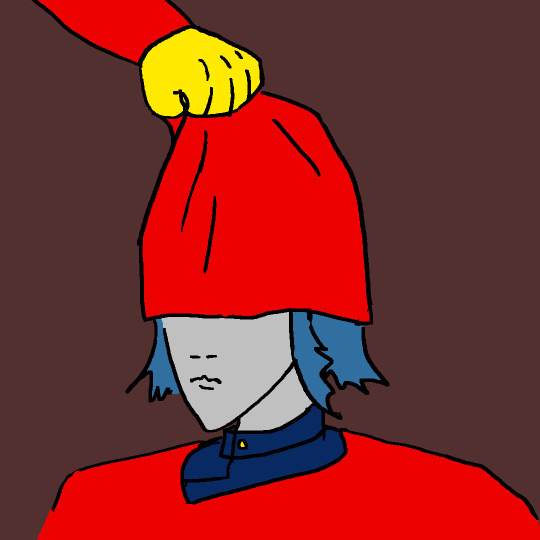
The second panel is the unmasking. If we had the right character, we could end it here. A highly-recognizable, prominent economist or capitalist-aligned politician would be appropriate, but we could also replace the head with a book such as The Wealth of Nations, which would certainly be unexpected, but consistent with market-based position advocated in the first panel.
However, the character used is actually the avatar of the blog Mitigated Chaos, which most outside readers would not be familiar with, so we need a third panel to explain.
In retrospect, only showing half the head here is unfortunate; comics are a visual medium, and if it were done again, there might be another way to arrange it.
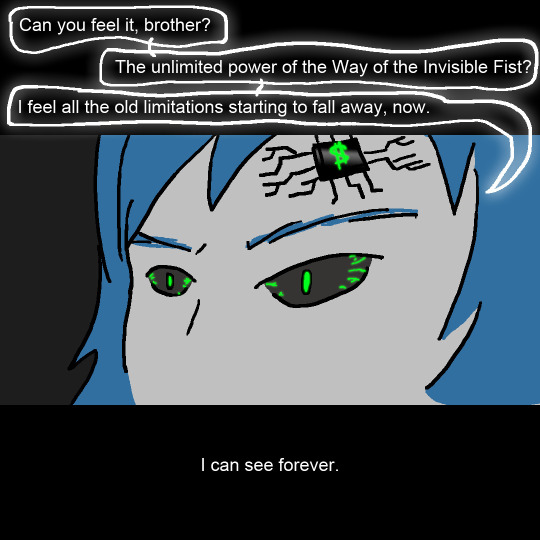
While left-wing memes are often described as too long, right-wing memes are often described as quite a bit shorter. The irony is that fully explaining this panel would take quite a bit longer than the first one!
This panel is a reference to the immense productive capacity, largely through technology, that humanity has gained under capitalism, which simulates evolution-like dynamics at the firm level.
Rather than Adam Smith's more benign "invisible hand," this panel treats the competition under capitalism as fierce, not market aid, but market discipline - an invisible fist. At the same, "The Way of the Invisible Fist" suggests that it's like a martial art, and can be taught and learned. This is not an attack, but an invitation ("Can you feel it, brother?") to learn.
"I can feel all the old limitations starting to fall away, now," refers partly to the immense rise in production capacity changing the nature of humanity's environment, such as reducing the burden of infectious disease and famine, which had been with humanity essentially for as long as we've been humanity (more so under early agriculturalism).
...but, along with the computer chip integrated into the forehead, it also refers to the likely condition of capital being directly integrated into or influencing the human body sometime later this century.
However, it also refers to the way that humanity have now tightly integrated capital into our lives, living in such a way that our very survival depends on the capital system within which we live, and which surrounds us at all times. It is very far away from the jungles or even the low-energy farming of the medieval era.
If you learn economics and make projections of the future, you can see "forever," which is clearly exaggerated both to accentuate the frightening nature of this apparently Nick-Land-like view, but also describes the elements of current society that might not be visible to Comrade A due to their lack of knowledge of this system.
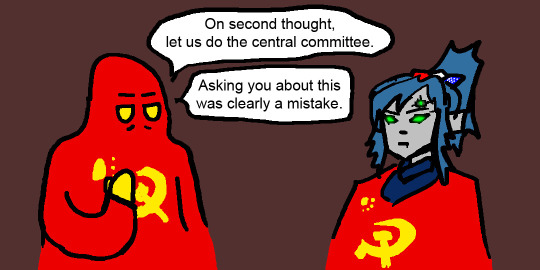
However, ending it on the third panel would have looked a little too, "I'm cool; you're not," so on the fourth panel we zoom out, which reduces the resolution of the more "serious" style from panel three, and provides some contrast with Comrade A.
Here, Comrade A is presented as lacking the advanced techniques our Invisible Fist practitioner has, but as overall more reasonable than we might expect.
There's a sort of natural tension between the economic optimization in third panel, and the needs of humanity more broadly. Comrade A's plan is less efficient, but lacks that terrifying edge.
His last statement is his personal opinion, but it's left to the reader whether they agree with it - though it is clearly communist.
Tumblr user oligo* once reblogged a fantastic meme regarding Landian Acceleration. I went looking for it, and as it happens, I found it.
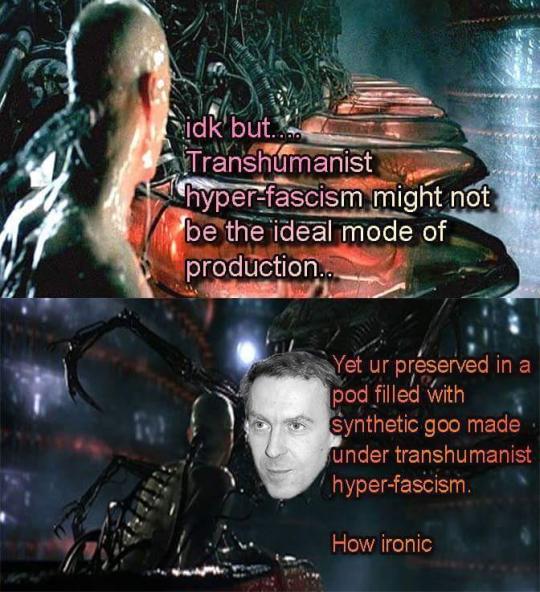
Is this a leftist meme? I think it is! It also appears to be a reference to this much more common meme image, but much less annoying.
Let's talk about it for a little bit!
There are two key things to understand about this, mechanically. First, the thing about internet memes in this sense is that they're significantly a visual art form. Second, they're not supposed to appear to be high-effort.
This meme uses screenshots from the very popular and well-known 1999 movie The Matrix, which provides it appropriate visuals while, because it's so well-known, establishing that the author didn't put in the effort to draw this all themself.
You could draw something like this scene, but then you would need to aim for a different format.
In the second frame, we then get the "crudely"-photoshopped Nick Land head as a visual part of the punchline. (In fact, the author has been careful in trimming it, but simply hasn't integrated the head back into the scene at all.)
Spider-robot-Land doesn't even say the criticism is bad, per se, he just says it's "ironic" - which it is. Nature is brutal, and yet humanity evolved from within nature until we were able to establish civilization.
Also note that you're unlikely to see a lot of criticism for the amount of text here. It's more than a typical image macro, but it's appropriate, so it gets a pass.
Let's try something of mine that's a little more popular.

The Rock Island Willerbean post has 5,600 notes. As some of you are probably guessing, yes, it's about the illegal trafficking of slow lorises, which apparently have venom glands in their armpits removed by smugglers. (Supposedly, when they raise their arms, it means they're terrified.)
As you can see, almost half the image is a textbox!
The use of text in internet memes or images generally very much depends on the context. Here, the image presents itself as a picture from a book. The text works due to presenting itself as a something like a wildlife narrator, but is clearly absurd by referring to a non-existent animal.
The content is both political and ideological - it's in favor, although it doesn't state this directly, of animal conservation.
But this particular approach isn't something you can do very often. You might be able to frame, e.g., a particular variety of car as a wild animal in order to express car opinions about it. But this would fall flat for most political attacks.
Let's talk about a leftist wall-of-text meme flop. Bing has helpfully provided me with an example, which I assume is real because it hits just the right range.
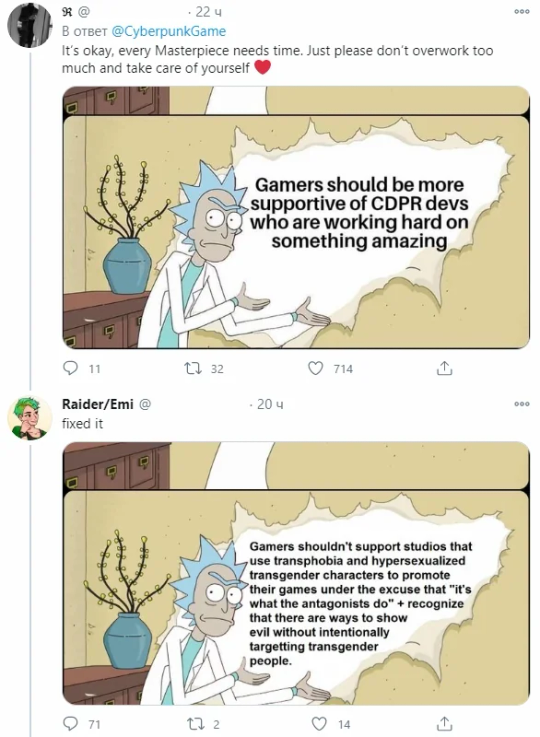
This is less text than is used in the Rock Island Willerbean example above.
The problem is not the number of words, but the combination of this number of words with this particular template. When Rick is showing us the torn hole in the wall, the contents should be direct and immediate, as this is what the visual language of the template is about.
Obviously, a lot of political conflict involves shaping the social terrain in order to determine what counts as "obvious" and what needs 500 words of explanation, giving relative advantage to different factions in on-the-ground social encounters. We aren't going to cover all that here.
This appears to be an argument about the Chromanticore vending machine and advertisements from Cyberpunk 2077. If you've played Cyberpunk 2077, you know the one I'm talking about. (It's a bit lewd.)
Cyberpunk 2077 is about a high-energy society with a breakdown of societal norms. As such, hyperstimulus that previously would not have been possible is made possible by technology, and active state intervention to regulate it does not occur. It's filled with lurid advertisements that are basically soft core, substituting the simulation of what people crave for the substance, a splitting of human desires from an evolutionarily more cohesive whole.
A lot of it's also about somatic capital technology and the increasing changeability of the body under transhumanism. I could really go on all day about this.
But basically, the chromanticore ad is shocking to contemporary viewers, but in Cyberpunk 2077's society, it's just mildly unusual - that particular body configuration would be uncommon, but Night City's residents wouldn't see it as unheard-of, and would instead have rather different gender war opinions about it than we would. Presumably you can just buy a ---- from a megacorp if you want one. (It seems the player can.)
The game's developers arbitrage this to create an environment that has a high hit or impact and feels very different or alien, providing the player with a unique experience.
Let's redo Raider's meme above to fit the template better.
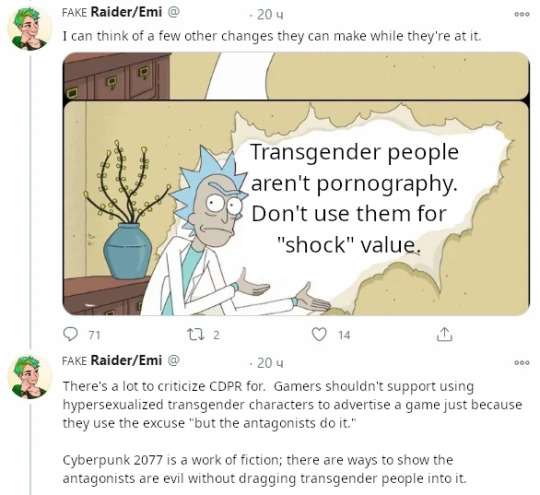
It's tempting to jam preloaded counter-arguments into the image macro, but that isn't really the right place for them. The Internet is loaded with text, and most of it isn't of much interest to most people. The image macro is the hook. You want to get your central idea across, while convincing potential readers that it's worth listening to the rest of your ideas.
Thus in the updated version, we move text out of the image, and into the surrounding posts.
I get the motivation - the image is seen as a complete unit, so therefore, if the reader has seen the image, they've read the argument. And well, if they've read the argument, then they don't have the excuse of not having read the argument, so they know they're wrong, and should just shut up and do what they're told.
Problem is, you can't jam enough text into an image macro to cover all the counter-arguments. The position of the people who don't think the Chromanticore ad is a big deal is generally that they don't think it has all that much of an effect. The initial image macro does nothing to address this.
They might be persuaded if Cyberpunk 2077 depicted transgender people as uniquely evil, or if it presented someone who is transgender because they are evil, but instead the two most prominent transgender characters in the game are one character that briefly whines about the effort put in to pass, and a bartender... who joins the main character in an illegal underground street race, which is roughly the normal level of criminal activity for Cyberpunk 2077.
We could also talk about coalition membership where the goal of Raider's original post is to communicate to swarm CDPR by signalling to like-minded members of their coalition about what they're 'supposed' to do, using that kind of language to establish group membership. But that's a bit beyond the scope of this post.
Anyhow.
Another use for image macros is in an attempt to pithily shut down arguments. These tend to get pretty annoying, and a lot of times it means that the poster is trying to pretend that the debate is over and lay still and be slippery like a dead fish, to deny leverage and show coalitional loyalty. (They'd rather be thought an idiot than be thought disloyal.) I'll discuss the dead fish tactic some other time, probably. (Already wrote a big draft on it.)
The following is not exactly that kind of image macro.
A communist tumblr user misremembered a stat about container shipping, and made this post:
If you extoll the virtues of modern shipping logistics and think the only problem with it is that it isn’t used to distribute things fairly, you’re an idiot. This isn’t even an anti-civ or pro-civ primmie discourse thing. Just 15 freight ships produce more CO2 than the entirety of the world’s automobiles, and there are thousands of them in service. The efficiency you fetishize has a horrible environmental cost, and the best thing I can assume about you when you act like everything will be solved once it’s The People’s Railway is that you just don’t know what you’re talking about.
Usually this kind of person doesn't have good math and production sense. To grab the first link off the shelf,
Maritime shipping causes about 3% of global greenhouse gas emissions – even more than airplanes.
Ocean-bound freight is extremely cheap on an energy per unit weight basis, even cheaper than rail freight. So it was more fun to respond with a little art as bait, even though of course we know that tumblr user isn't going to take it.
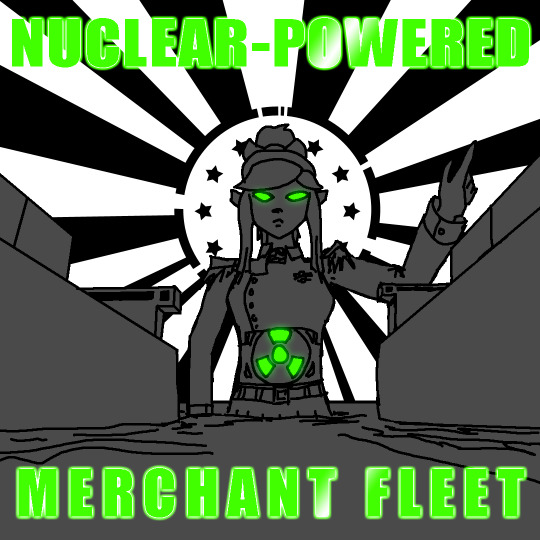
This is not a conventional finisher-dunk.
However, for reasons I'm not going to go into, finisher dunks should not be much longer than this.
21 notes
·
View notes
Text
I often think about the absence of parasocial relationships in my life. To be candid, I believed I had outgrown them. Celebrity culture is something that I have come to dislike a lot. I really try and refrain from investing excessive energy into one-sided and distant connections. We all have our moments every once in a while, though. Last night, I stayed up to watch Usher's halftime Super Bowl performance. I enjoyed it, sang along to my favourites, and that was that.
The gravity of current global events, particularly Gaza, really makes me reassess.
Amidst countless headlines celebrating the Chiefs and Taylor Swift's love life, my attention remains fixated on the bombing of Rafah by Israel. Rafah, a place where civilians were told would be safe was heavily targetted all the while Israel ran a propoganda ad during the biggest annual sporting event in America (newsflash: if you can afford to run ads like last night's during the biggest NFL weekend, then you're not the victim, sorry). The juxtaposition of reports from Gaza during a Super Bowl served as a stark reminder of the world's pressing issues.
I don't advocate for people to cease enjoying sports. That's lame and not realistic. But I urge us (myself included!) to scrutinise our relationships, especially parasocial ones. These one-sided relationships, where emotional energy, interest, time, and, worst of all, money are directed towards an entity that is unaware of the other's existence, permeate our society.
Adults may believe they are immune to such connections. But many still form strong bonds with sports teams, athletes, artists, actors, and online influencers. Adult men especially will make fun of teenage girls for their interests but have the same one-sided relationship with athletes and Twitch streamers. They are not free from it. None of us are. It's all the same. These relationships wield such influence over us as individuals, and they truly transcend age and gender boundaries. Addressing this issue requires a collective effort to de-emphasise or, ideally, render parasocial relationships unnecessary.
The dismantling of community structures has exacerbated this problem. The decline of social organisations, the lack of third places, the consequences of suburban living, and the increasing loneliness point to a broader societal issue. As our communal ties weaken, we not only experience individual isolation but also lose collective influence over our lives. Political and economic forces contribute to this isolation, making it challenging to resist gentrification and maintain connected communities.
How many of us constantly think about these systemic issues? I understand that this being at the forefront of our minds would be extremely exhausting, but we should at least be aware, no? Depoliticization and a plethora of distractions, from social media to celebrity culture, is really limiting us, as individuals and as a society. I am not sure if I am ready to go down the full conspiracy rabbit and say that these distractions are intentional political tools, but they do serve capitalists seeking profits from individuals seeking connection and fulfilment in the frankly very fucked up world we find ourselves in.
Substituting real relationships with parasocial ones may seem convenient, even momentarily fulfilling, in our current environment saturated with online connections. Yet, these connections prove to be shallow and hollow substitutes for genuine human connection, intimacy, and collective participation. On a personal level, it is time to intentionally prioritise meaningful relationships with neighbours, coworkers, family, and friends. On a communal level, we must build and rebuild structures and organisations that facilitate collective gatherings, fostering connections and consolidating our collective power for positive change.
As headlines continue to feature Taylor Swift, the Super Bowl, the Oscars, etc... I believe that there should be an urgency in redirecting our attention to critical issues, such as Gaza and the recent attack on Rafah. While transitioning from a world dominated by parasocial relationships to one marked by justice, connection, and peace may seem daunting, it starts with individual efforts – reaching out, engaging in one-on-one conversations, and building relationships. Over time, these personal connections will empower us to act collectively, contributing to a world where inter-connectedness and reciprocity prevail.
#gaza#palestine#rafah#super bowl#taylor swift#usher#celebrity culture#anti celebrity culture#anti capitalism#anti consumerism#anti consumption#parasocial relationships#i hate doing tags
20 notes
·
View notes
Text
BTW we are basically seeing if we can sue our employer for wrongful termination down the line cause they fucked up and decided to pull a scummy move to save what would be at most $600 when we were already planning on resigning amicably
And like its not a huge deal if it goes through or not and Im not in it for the money or doing it for the money cause idc really since I was planning on resigning anyways and it just means I qualify for unemployment while I'm out of a job which makes up for it
I'm just doing it on principle and out of spite. Spite cause it was a personally scummy move. Principle cause on a political, economic, social level, I really don't like people pulling ableist and capitalist moves that undermines workers rights.
They literally did the worst look, worst play to someone who is going to be put out on medical disability for a month who is a workaholic and needs 40 projects to juggle and was raised by an S Tier Karen in the art of stressing capitalists out.
I got a month of a whole lotta nothing to do for a while and thus a whole lotta time to invest into a passive game of "Im reporting this to HR, The Union, Disability Advocacy Centers, and Low Income Legal Aid groups cause I literally wont have anything better to do and even with it Id still be bored."
Its honestly a really dumb play and I'm going to have fun seeking advice from lawyers and unions and what not to see the full level of which I can either demand compensation or just give them a hard time
And at the very least, make sure that HR knows about the toxic environment and gets on their ass to fix it cause I do feel bad that I left the one person who really supported me down there with one ally and three people I know talk shit about her constantly
Dear Boss,
You fucked up and fuck you in a professional legal manner.
Sincerely,
Worker and Disabled People's Rights
((Btw we actually took a chemistry professors job in our undergrad cause he was an ableist dickhead so its not our first rodeo complaining professionally to a californian university about injust behaviors and actions among their faculty and staff. That is still THE highlight of my undergraduate experience.)
Anyways, the XIV part of our brain whose whole function as a part is to shake shit up and destroy things that he sees as corrupt is so excited to have a project to do while we recover along side my TTRPG and Art stuff.
#alter: fei#alter: xiv#<- very heavy xiv dominance in this fused state#ableism#union#unions#lawsuit saga?#lawsuit saga#technically not but I like that tag
22 notes
·
View notes